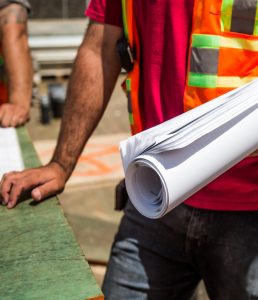Accounting Considerations for the Trades
The finances of trade services seem like they should be simple: You have a leaky faucet, you call a plumber, they fix it, you pay them. From the customer’s side, it appears an easy transaction. For small business owners in the trades, however it’s much more complicated.
As though ladder falls, electrical fires, and rusty nails weren’t enough to worry about, skilled tradespeople also face the dangers of Department of Revenue audits and high-volume aged receivables. So for our month of industry-focused accounting, we’re focusing week two on accounting considerations for those in the trades.
Concern #1: Getting paid.
 Performing a job, particularly if parts have to be purchased, can be a costly endeavor. If employees have to be paid for extra hours or extra help brought on, it can be even more expensive. So when customers don’t pay, you, the owner is severely put-out.
Performing a job, particularly if parts have to be purchased, can be a costly endeavor. If employees have to be paid for extra hours or extra help brought on, it can be even more expensive. So when customers don’t pay, you, the owner is severely put-out.
There are ways for business owners to protect themselves and prevent slow/no-payers. The first, most obvious step, is to take a deposit, at least enough to cover parts and materials that must be purchased. This way, even if the job is cancelled, you’re not stuck with the costs of materials you don’t need.
The second is to establish clear terms of invoicing and payment, and to make sure both sides understand and agree to them. This can be particularly important when doing commercial work, as businesses often have more rigid rules about how they are invoiced, how POs are issued, and how payments must be approved internally before being remitted.
The third is simply having a system in place by which you follow up on overdue invoices. We do accounts receivable work for some of our clients, and you would be amazed how much money can be collected by simply calling and reminding customers that a payment is overdue. Though there are exceptions, of course, most people do want to pay their bills in a timely matter, and are happy to make right on an overdue account.
Concern #2: Job-costing.
 In the prior entry, we referenced the costs associated with an individual job, such as labor and materials. However, there is also travel time to be considered, as well as overhead allocations (how you proportion out fixed costs to specific jobs). Though it can be a lot of work to set up an effective job-cost tracking system, the data it provides is invaluable for business planning and expansion purposes, and for determining profitability of different types of jobs, and for pricing strategy.
In the prior entry, we referenced the costs associated with an individual job, such as labor and materials. However, there is also travel time to be considered, as well as overhead allocations (how you proportion out fixed costs to specific jobs). Though it can be a lot of work to set up an effective job-cost tracking system, the data it provides is invaluable for business planning and expansion purposes, and for determining profitability of different types of jobs, and for pricing strategy.
In particular, tracking mileage and other travel costs can help immensely in determining how jobs are scheduled efficiently. Fuel costs alone can be significantly reduced with more strategic scheduling, as well as labor costs associated with travel time. Even things such as travel to vendors with preferred pricing can be optimized. However, if that data is not being tracked, it can’t be studied nor put to use.
Concern #3: 1099s.
 It’s common in the trades, more than any other industry, to hire short-term help for only a single job or handful of jobs. Without proper preparation, this can be very dangerous for a business owner when it’s time to file 1099s. Essentially, the IRS requires that a 1099 be filed for every contract worker who received more than $600 in cash or check for services in a calendar year. (And there are steep penalties at both the state and federal level for failure to do so.)
It’s common in the trades, more than any other industry, to hire short-term help for only a single job or handful of jobs. Without proper preparation, this can be very dangerous for a business owner when it’s time to file 1099s. Essentially, the IRS requires that a 1099 be filed for every contract worker who received more than $600 in cash or check for services in a calendar year. (And there are steep penalties at both the state and federal level for failure to do so.)
To file a 1099, you have to have a W-9 from the worker. If you paid someone for a single job in February of the prior year, it can be hard to track that individual down several months later to get a W-9 (especially if they know it means you’re trying to report their income to the IRS). We strongly recommend collecting W-9s (and Certificates of Insurance, where applicable) from contractors prior to paying them.
Concern #4: Sales tax.
 North Carolina Department of Revenue shook things up a few years ago in 2016 when they began requiring sales tax be collected on additional services. Under the change in law, sales tax is now charged on repair, maintenance, and installation of “tangible personal property”. This means that, for example, someone installing an HVAC unit would have to collect and remit sales tax on not only the unit, but on the installation service as well.
North Carolina Department of Revenue shook things up a few years ago in 2016 when they began requiring sales tax be collected on additional services. Under the change in law, sales tax is now charged on repair, maintenance, and installation of “tangible personal property”. This means that, for example, someone installing an HVAC unit would have to collect and remit sales tax on not only the unit, but on the installation service as well.
Where this becomes complicated is that the sales tax expansion does not apply to services on “real property” (i.e. homes or other buildings). However, to protect themselves, tradespeople performing services on real property should obtain Affidavits of Capital Improvement in order to confirm that sales tax is not applicable on each specific job. (This is particularly true for general contractors performing remodels, or their subcontractors.)
Because there is so much variability and “gray area” within financial accounting for the trades, we recommend you speak to your accounting professional regarding any questions you might have for your business’s unique situation. If you don’t have an accounting professional, we might be the right people for the job.
Contact us to schedule a free 1-hour consultation; we’re happy to answer your questions.
Getting Ready for Year-End Starts Now
You may be lamenting the fact that stores already have Halloween decorations out but, here at The Bookkeeper, we are already preparing for year-end.
In an effort to help our clients (and everyone else) get ready, we’re putting out a list of things you can start doing now to ensure a smooth first quarter and segue into tax season.
Hire a tax preparer.
 If you don’t already have a CPA or EA lined up for your year-end taxes, start interviewing now. They will get very busy by the end of the year, and the good ones tend to fill up on clients quickly. (If you need a referral for a good tax preparer, we are happy to provide some!)
If you don’t already have a CPA or EA lined up for your year-end taxes, start interviewing now. They will get very busy by the end of the year, and the good ones tend to fill up on clients quickly. (If you need a referral for a good tax preparer, we are happy to provide some!)
Get last year’s records handy.
 If you are using a new tax preparer, they will likely want to see a copy of your prior year tax returns. If available, a copy of your balance sheet from the end of the prior year will be helpful, as well.
If you are using a new tax preparer, they will likely want to see a copy of your prior year tax returns. If available, a copy of your balance sheet from the end of the prior year will be helpful, as well.
Check your sub-ledgers.
 If you have a copy of your balance sheet handy, it’s a good idea to go ahead and take a look at your sub-ledgers, your Accounts Payable and Accounts Receivable. It may be that interest hasn’t been properly recorded on some of your loans, and that you are missing out on a deductible expense there. Or, if you are accrual-basis and have receivables outstanding, you want to either follow up on those clients for payment, or write off any unrecoverable invoices, so you aren’t liable for taxes on income which you’ll never receive.
If you have a copy of your balance sheet handy, it’s a good idea to go ahead and take a look at your sub-ledgers, your Accounts Payable and Accounts Receivable. It may be that interest hasn’t been properly recorded on some of your loans, and that you are missing out on a deductible expense there. Or, if you are accrual-basis and have receivables outstanding, you want to either follow up on those clients for payment, or write off any unrecoverable invoices, so you aren’t liable for taxes on income which you’ll never receive.
Review uncleared transactions and amortizable expenses.

If you are filing accrual-basis, you will also want to be sure you have a record of checks which were written but have not cleared the bank, as these expenses should be deductible in the same calendar year they were incurred.
Also, if you have any assets on the books for prepaid expenses, be sure those were expensed properly throughout the year, so they will lower your taxable income.
Prepare your 1099 list.
 You will be liable for filing 1099s for any non-incorporated service provider to whom you have paid over $600 in cash receipts within the calendar year. To file 1099s, you will need a W-9 from each vendor fulfilling that criteria, and a total of how much you paid them this year.
You will be liable for filing 1099s for any non-incorporated service provider to whom you have paid over $600 in cash receipts within the calendar year. To file 1099s, you will need a W-9 from each vendor fulfilling that criteria, and a total of how much you paid them this year.
What’s worse is that 1099s are actually due not at tax time, but at the end of January, and the penalties for late or missing 1099s are stiff. So start gathering that information now!
Start your payroll reconciliations.
 If you have staff, or yourself, on payroll via an outsourced service, it’s a good idea to review the reports on a quarterly basis, to make sure that what you have in your set of financials matches the payroll provider’s records. You want to also ensure that any taxes they have taken on the responsibility of paying have been paid in a timely fashion.
If you have staff, or yourself, on payroll via an outsourced service, it’s a good idea to review the reports on a quarterly basis, to make sure that what you have in your set of financials matches the payroll provider’s records. You want to also ensure that any taxes they have taken on the responsibility of paying have been paid in a timely fashion.
W-2 corrections take time, and you can be liable if W-2s are late. If there’s an issue in your payroll reporting, it’s best to locate it before year-end, when the payroll companies will be at their busiest.
Finally, don’t forget that any bonuses you plan to pay employees around the holidays are treated as W-2 earnings, and should be run through regular payroll.
Pay your quarterly estimated self-employment taxes.
 Paying in on a quarterly basis is a good way to avoid a massive tax bill the following spring. But be aware, the next due date is only 9 days from now, on September 15th!
Paying in on a quarterly basis is a good way to avoid a massive tax bill the following spring. But be aware, the next due date is only 9 days from now, on September 15th!
Make sure you’re not missing anything.
 Be certain there’s a record of any business expenses you might have paid out of personal accounts, and that any transactions which have been uncategorized to this point are properly allocated. And if you find that it’s been an unexpectedly successful year and you need to lower your taxable income, (particularly if you’re cash-basis), you might want to consider going ahead and paying for some of your typical January expenses earlier, in December before the year ends.
Be certain there’s a record of any business expenses you might have paid out of personal accounts, and that any transactions which have been uncategorized to this point are properly allocated. And if you find that it’s been an unexpectedly successful year and you need to lower your taxable income, (particularly if you’re cash-basis), you might want to consider going ahead and paying for some of your typical January expenses earlier, in December before the year ends.
Ask for help, if you need it.
 If you’re finding that you don’t have an up-to-date set of books, and you’re feeling overwhelmed, don’t be afraid to ask for help. If you’re already behind, the last thing you want to worry about is catching up your books over the holidays. We’re here to take that off your plate so you can focus on the things that matter most to you at this time of year.
If you’re finding that you don’t have an up-to-date set of books, and you’re feeling overwhelmed, don’t be afraid to ask for help. If you’re already behind, the last thing you want to worry about is catching up your books over the holidays. We’re here to take that off your plate so you can focus on the things that matter most to you at this time of year.
Planning to rent out a home? Be prepared.
Everyone likes a little extra income, and the "sharing" economy has made that easier than ever. For those with a second property, options like Airbnb and VRBO have become very popular as means of procuring rental revenues. However, renting a home through one of these services can include tax implications of which many are unaware. If you are operating as a landlord for short-term rentals, here are some things you should know.
What qualifies as rental property?
 The IRS has a great deal of information on classifying rental properties in Topic Number 415. https://www.irs.gov/taxtopics/tc415
The IRS has a great deal of information on classifying rental properties in Topic Number 415. https://www.irs.gov/taxtopics/tc415
To be considered a rental property, the home in question cannot qualify as a residence. A residence is one in which personal use equals the greater of either 14 days or "10% of the total days you rent it to others at a fair rental price". So what does "personal use" mean, in this case? Personal use can be one of four scenarios.
1. When you or another individual who has an interest in the property (i.e., a business partner or co-owner) uses the property (unless that individual pays you a fair market price for rental). So, if your business partner's family uses the property for a vacation, that's personal use.
2. When a family member uses it without paying a fair price. If you let your niece rent it at half the usual rate while she's in town for the weekend, that's personal use.
3. "Anyone under an agreement that lets you use some other dwelling unit" Consider the rom-com "The Holiday", where Kate Winslet and Cameron Diaz swap houses with each other for a vacation. If you were to do something similar, those days spent at your house would county as personal use, since you were trading them for your own lodgings during that time.
4. Anyone at less than a fair rental price. This is self-explanatory, but also somewhat nebulous. Your best option is to have documentation supporting your pricing strategy, and apply it consistently.
Likewise, any expenses deducted must be deducted proportionally to the amount of time the home served as a rental. (So, if 5% of the year was personal use, only 95% of the appropriate expenses may be deducted.) If the property, in fact, does not meet the criteria to be considered a rental, you cannot deduct expenses on it. However, you also do not have to report rental income, in that case.
What can be deducted?
 Expenses that are necessary for "managing, conserving and maintaining your rental property" can be deducted. These could include plumbing repairs, or cleaning services. You can also deduct expenses related to the business of renting out the property, such as any host fees from Airbnb, or advertising and legal fees related to the property.
Expenses that are necessary for "managing, conserving and maintaining your rental property" can be deducted. These could include plumbing repairs, or cleaning services. You can also deduct expenses related to the business of renting out the property, such as any host fees from Airbnb, or advertising and legal fees related to the property.
You can also deduct any expenses which the tenant paid and which you then had to reimburse the tenant for. (For example, if the air conditioner breaks on the weekend, the tenant pays to fix it quickly, and you then reimburse the tenant, you can deduct that repair expense.)
You cannot deduct costs of improvements, those costs incurred in the act of restoring the property, or adapting it for a different use. You can, however, recover some of those costs on Form 4562 where you would report depreciation expenses.
Occupancy Tax
 Many states and municipalities require landlords to collect and remit occupancy tax on short-term rentals. (It's a bit like a sales tax, but for hotels.) You will need to closely examine your local laws, as they can vary greatly on tax rates, what constitutes short-term rental, how frequently it must be remitted, etc. To further complicate the matter, occupancy tax may be collected by states, counties, AND cities.
Many states and municipalities require landlords to collect and remit occupancy tax on short-term rentals. (It's a bit like a sales tax, but for hotels.) You will need to closely examine your local laws, as they can vary greatly on tax rates, what constitutes short-term rental, how frequently it must be remitted, etc. To further complicate the matter, occupancy tax may be collected by states, counties, AND cities.
Additional Taxes
 If you were to sell your property, after it has been designated as a rental, you will need to report the income from the sale as capital gains, and pay capital gains tax on that accordingly. If you are a high-income earner, you may also be responsible for net investment income tax. (See IRS Topic Number 559.) https://www.irs.gov/taxtopics/tc559
If you were to sell your property, after it has been designated as a rental, you will need to report the income from the sale as capital gains, and pay capital gains tax on that accordingly. If you are a high-income earner, you may also be responsible for net investment income tax. (See IRS Topic Number 559.) https://www.irs.gov/taxtopics/tc559
1099s
 As always, be sure that you are collecting W-9s from service vendors and following all applicable requirements for filing 1099s at year-end.
As always, be sure that you are collecting W-9s from service vendors and following all applicable requirements for filing 1099s at year-end.
We work with a number of property owners, on these very issues every day.



